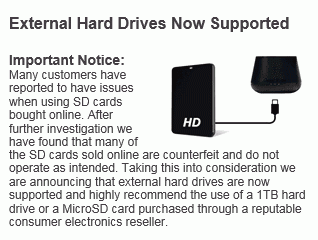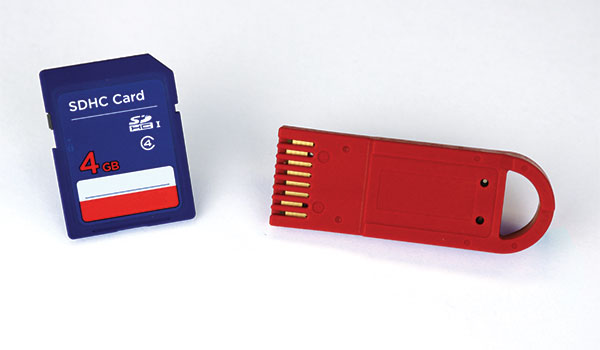Not All SD Cards Are Created Equal
Jun 06, 2018
Article
 The other day I received an email from a company that markets products to cord-cutters (people who discontinue paying cable or satellite providers for TV services and opt for less expensive or free alternatives). In the email, they were touting that one of their products now supports using an external hard drive, but that wasn't what caught my attention. What was most interesting to me was the reason why their product now supported external hard drives. Apparently, they had "many customers" who reported problems with their product. After some investigation, the manufacturer concluded that the problem was not with their unit, but lied with the SD cards these customers were using. The manufacturer concluded, "After further investigation we have found that many of the SD cards sold online are counterfeit and do not operate as intended." Their solution was to offer a different storage solution altogether, as they could not control which SD cards their customers used with their product.
The other day I received an email from a company that markets products to cord-cutters (people who discontinue paying cable or satellite providers for TV services and opt for less expensive or free alternatives). In the email, they were touting that one of their products now supports using an external hard drive, but that wasn't what caught my attention. What was most interesting to me was the reason why their product now supported external hard drives. Apparently, they had "many customers" who reported problems with their product. After some investigation, the manufacturer concluded that the problem was not with their unit, but lied with the SD cards these customers were using. The manufacturer concluded, "After further investigation we have found that many of the SD cards sold online are counterfeit and do not operate as intended." Their solution was to offer a different storage solution altogether, as they could not control which SD cards their customers used with their product.
One of our Datakey products, the DFX RUGGEDrive memory token provides SD card functionality in our more robust and proprietary form factor. When talking to potential customers about our DFX memory tokens, one question that frequently comes up is, "Why would I want to use your proprietary SD product over a standard SD card?" One of the reasons I give has to do with the situation I just mentioned. When an OEM designs a DFX RUGGEDrive memory token into their product, they only have one product they need to test and support. Because of the proprietary form-factor, it's the only thing that will plug in. On the contrary, with a standard SD card slot, the OEM is signing up to support (whether they realize it or not) every card that will fit in that slot. This includes all of the SD cards ever made, all those that can be purchased now and even cards that will be released in the future. If it fits into the slot, there is an expectation by the customers that it will work. The problem is the OEM can't control which SD cards their customers will use.
 "But wait a minute," you might be thinking, "SD is a standard! Shouldn't every SD card just work?" In theory, if everyone would play by the rules, then maybe that would be true. But clearly that is not the case. The other thing to keep in mind is that even the SD standard is not fixed--it changes over time. You may remember SD (capacities up to 2GB). Then there was SDHC (capacities of 4GB to 32GB). Then there was SDXC (capacities of 64GB to 2TB). And soon there will be a new version that will support capacities greater than 2TB. Historically, systems designed to work with cards of one version, will not work with the newer cards (that were in the future when the system was designed). For example, a system designed in 2007 to use standard SD cards, would not work with SDHC cards when they came out.
"But wait a minute," you might be thinking, "SD is a standard! Shouldn't every SD card just work?" In theory, if everyone would play by the rules, then maybe that would be true. But clearly that is not the case. The other thing to keep in mind is that even the SD standard is not fixed--it changes over time. You may remember SD (capacities up to 2GB). Then there was SDHC (capacities of 4GB to 32GB). Then there was SDXC (capacities of 64GB to 2TB). And soon there will be a new version that will support capacities greater than 2TB. Historically, systems designed to work with cards of one version, will not work with the newer cards (that were in the future when the system was designed). For example, a system designed in 2007 to use standard SD cards, would not work with SDHC cards when they came out.
What the DFX RUGGEDrive memory token gets you is the SD card functionality you were looking for, but it ensures that it is the only product your customers can use. While that may seem limiting (and it certainly is), it ultimately can lead to a better user experience, because It makes it impossible for them to use a counterfeit card or even a future card that your system doesn't support.
For more information on the RUGGEDrive line of SD and USB flash drive products, check out the RUGGEDrive product page.

Paul Plitzuweit
Senior Product Manager, Datakey
ATEK Access Technologies, LLC